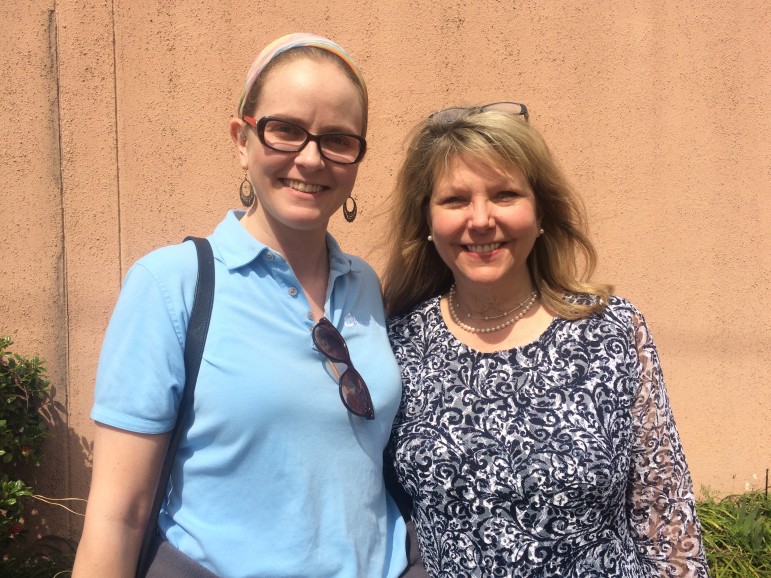Crime in Greater Birmingham: Impact of Social Media
Elizabeth Sanfelippo is an energy consultant who lives in Birmingham’s upscale Highland Park neighborhood. She grew up outside of Birmingham and lived in Vermont and New York before coming back to her beloved hometown. When she wants to know what’s happening in the area, she picks up her smartphone and presses a green icon with a white house on it, opening the Nextdoor app.
Nextdoor acts as a digital community message board. Scrolling through it today, she lists what’s posted.
“There’s some things that people are selling, things that people are giving away, lost pets,” she reads. Sanfelippo says she likes being connected to her neighbors. She is one of many people who use social media to organize, communicate and increasingly get news. Recently some Birmingham area residents say they’re seeing more and more crime stories in their news feeds.
“Scrolling through, it’s good to see that there are other things being posted than crime today,” Sanfelippo remarks. She’s personally seen an uptick in the number of posts about car break-ins and robberies on Nextdoor these past few months. That makes her uncomfortable.
“I’ve been more nervous to walk outside than I ever was to walk out of my apartment in East Harlem,” she explains. “I’ve been more on alert here than I was in New York.”
Sanfelippo’s not alone in her anxiety. Birmingham finished 2015 with an increase in homicides, fueling a perception that crime is on the rise. However, the Birmingham Police Department says excluding homicides, crime was down last year.
“Especially when you get to the local level, what’s being discussed on Facebook pertaining to crime and crime activity is inevitably perceived as happening everywhere in the Birmingham metropolitan area,” says Sergeant John Pennington with the Jefferson County Sheriff’s Office. He’s received panicked calls from residents who read about crimes that happened on the opposite side of the county.
“They wanted to know what we were going to do about the crimes as if they were happening in their community. They were actually under the impression that it was occurring right there,” Pennington says.
In some of its darkest moments, social media has even led to crimes in Birmingham. Police Chief A.C. Roper remembers one high-profile homicide from last February.
“I’m thinking about how the 14-year-old who died in the park because of something on Facebook,” says Roper. “Her and the other girls planned to go there and fight, but then one of the boyfriends pulls out a gun and starts shooting.”
But UAB criminal justice Professor John Sloan says there is a bright side: those digital fingerprints can provide vital information to police and help solve crimes.
“One thing that police are doing differently now is using social media as a source of intelligence,” says Sloan. “They are actually culling social media to collect information that people will post about their own involvement in criminal activities.”
Sergeant Pennington says the Jefferson County Sheriff’s Office is also using social media to connect with residents in more meaningful ways. Most area law enforcement already use Facebook and Twitter, but the sheriff’s office recently joined Nextdoor. He says they hope using that location-specific social network can keep people more informed and conscious of their surroundings.
“We were really trying to find a conduit social media platform by which we could kickstart that knowledge and awareness among people,” Pennington says. Nextdoor has worked elsewhere in the state and was recently embraced by the Mobile Police Department.
Birmingham resident Elizabeth Sanfelippo says she couldn’t be happier about this development and hopes the Birmingham Police Department joins Nextdoor as well.
“I think it’s sort of a neighborhood watch but with a more electronic, modern twist,” she says.
Sanfelippo’s local online community is now talking face-to-face. She’s organized a group called B SAFE with people she met on Nextdoor. They’ve met three times so far, and Sanfelippo says about 30 to 40 people showed up. She hopes this can lead to an active, in-person neighborhood watch for Highland Park and says that will make her and her neighbors feel safer.
Photo by magicatwork 
How could the U.S. strikes in Iran affect the world’s oil supply?
Despite sanctions, Iran is one of the world's major oil producers, with much of its crude exported to China.
Why is the U.S. attacking Iran? Six things to know
The U.S. and Israel launched military strikes in Iran, targeting Khamenei and the Iranian president. "Operation Epic Fury" will be "massive and ongoing," President Trump said Saturday morning.
Sen. Tim Kaine calls on the Senate to vote on the war powers resolution
NPR's Scott Simon talks to Sen. Tim Kaine, D-Va., about the U.S. strikes on Iran.
Iran strikes were launched without approval from Congress, deeply dividing lawmakers
Top lawmakers were notified about the operation shortly before it was launched, but the White House did not seek authorization from Congress to carry out the strikes.
Political science expert weighs in on Iran’s nuclear program in light of U.S. strikes
NPR's Scott Simon speaks to Ariane Tabatabai, the Public Service Fellow at Lawfare, about U.S. attacks on Iran and how President Trump's calls for regime change might be received there.
Week in Politics: Does Trump have political support for his actions in Iran?
We look at what President Trump's decision to attack Iran means, what kind of support he has in Iran and what this moment means for his administration.





